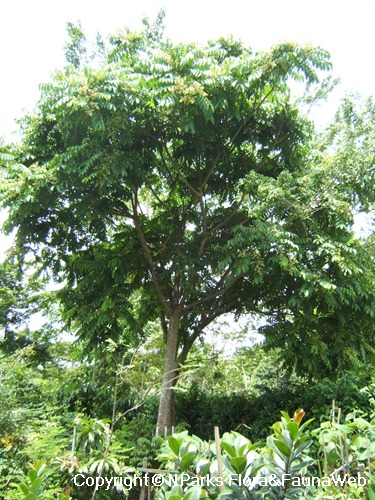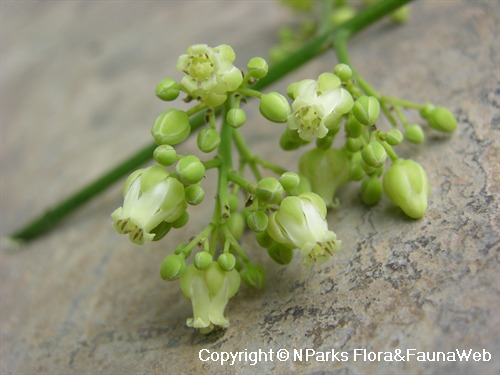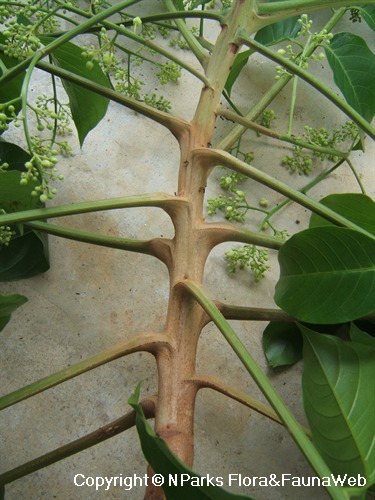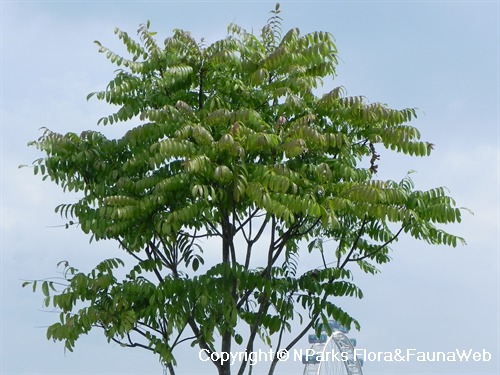
Back
Dracontomelon dao (Blanco) Merr. & Rolfe
| Family Name: | Anacardiaceae |
| Synonyms: | Dracontomelon laxum, Paliurus , Dracontomelon sylvestre, Dracontomelon edule, Dracontomelon puberulum, Dracontomelon lamiyo, Dracontomelon brachyphyllum, Dracontomelon mangiferum, Comeurya cumingiana, Paliurus edulis |
| Common Name: | Argus Pheasant Tree, New Guinea Walnut, Pacific Walnut, Papuan Walnut, Asam Kuang, Sengkuang, Sekuan, Kueh |
Name
Classifications and Characteristics
| Plant Division | Angiosperms (Flowering Seed Plants) (Dicotyledon) |
|---|---|
| Plant Growth Form | Tree (Big (>30m)) |
| Lifespan (in Singapore) | Perennial |
| Mode of Nutrition | Autotrophic |
| Plant Shape | Rounded |
| Maximum Height | 36 m |
| Tree or Palm – Trunk Diameter | 0 m to 1 m |
Biogeography
| Native Distribution | From India, Myanmar, Thailand, Cambodia, southern China, Southeast Asia to Solomon Islands. |
|---|---|
| Native Habitat | Terrestrial (Primary Rainforest, Monsoon Forest, Riverine) |
| Preferred Climate Zone | Tropical, Sub-Tropical / Monsoonal |
| Local Conservation Status | Native to Singapore (Critically Endangered (CR)) |
Description and Ethnobotany
| Growth Form | Large evergreen canopy tree, up to 36m height, with dense rounded crown. |
|---|---|
| Trunk | Bole straight and cylindrical, unbranched to 15m height, with root buttress at base. Outer bark greyish-brown, inner bark pink. Wounded bark exudes slightly sticky colourless resin that turns pale golden upon exposure to air. |
| Foliage | Leaves compound-pinnate, spirally-arranged around branchlet. Leaflets prominently veined, alternate on rachis 0.30-0.45m long. |
| Flowers | White, small (9mm across), 5-lobed, fragrant, produced in large pendulous panicles up to 0.6m long. |
| Fruit | Slightly fleshy drupes, globose, 2.5 - 4.0cm across, produced in clusters, ripening from green to yellow. |
| Habitat | Moist primary rainforests, especially along riverbanks and in swampy sites, occasionally flooded for short periods. |
| Cultivation | Tolerant of waterlogged soils and temporary flooding. |
| Etymology | Genus epithet 'Dracontomelon' derived from Greek terms for dragon (draco) and melon, a reference to the fruits. Species epithet 'dao' derived from vernacular name for this tree in Philippines. |
| Ethnobotanical Uses | Edible Plant Parts : Edible Fruits, Edible Leaves, Edible Flowers Food (Herb or Spice) (Fruit or Vegetable) Others: Culinary: Fruits edible, not popularly eaten in SE Asia, but relished and stewed in honey in China. Seed kernels mixed into tea to provide fragrant and mucilaginous sweet taste. Medicinal: Leaves found to possess antiseptic properties against broad spectrum of bacteria. Fruits reportedly have cooling properties, used to treat sore throat, skin inflammation, itch, internal ulcers, as well as an antidote for poisoning. Bark boiled to make decoction drunk by women to expel fetal membrane from womb. Traditional beliefs suggest that holding a seed in right hand on odd days and in left hand on even days will accelerate childbirth. Culture: Seed used as toys by children. Timber: Wood is soft, light weight and not very durable. Typically used for making furniture, veneer, panelling, flooring, matches and boxes. |
Landscaping Features
| Desirable Plant Features | Fragrant (Flowers) (Day), Ornamental Trunk |
|---|---|
| Landscape Uses | General |
| Thematic Landscaping | Water Garden, Economic Garden, Naturalistic Garden |
Plant Care and Propagation
| Light Preference | Full Sun |
|---|---|
| Water Preference | Moderate Water, Lots of Water |
| Plant Growth Rate | Moderate |
| Rootzone Tolerance | Waterlogged Soils (Drains Site) |
Foliar
| Foliage Retention | Evergreen |
|---|---|
| Mature Foliage Colour(s) | Green |
| Mature Foliage Texture(s) | Smooth, Raised / Sunken Veins |
| Foliar Arrangement Along Stem | Spiral |
| Foliar Venation | Pinnate / Net |
| Foliar Margin | Entire |
| Leaf Area Index (LAI) for Green Plot Ratio | 4.0 (Tree - Dense Canopy) |
Non - Foliar and Storage
| Trunk Type (Non Palm) | Woody |
|---|---|
| Bark Colour(s) | Pinkish-Brown & Cream |
| Mature Bark Texture | Scaly |
| Stem Type & Modification | Woody |
| Root Type | Underground (Tap Root, Fibrous Root) |
Floral (Angiosperm)
| Flower & Plant Sexuality | Bisexual Flowers |
| Flower Colour(s) | Cream / Off-White |
|---|---|
| Inflorescence Type | Panicle |
| Ovary Position | Superior / Hypogynous |
| Flowering Habit | Polycarpic |
Fruit, Seed and Spore
| Mature Fruit Colour(s) | Yellow / Golden |
|---|---|
| Fruit Classification | Simple Fruit |
| Fruit Type | Fleshy Fruit , Drupe |
Image Repository
Others
| Master ID | 1995 |
|---|---|
| Species ID | 3287 |
| Flora Disclaimer | The information in this website has been compiled from reliable sources, such as reference works on medicinal plants. It is not a substitute for medical advice or treatment and NParks does not purport to provide any medical advice. Readers should always consult his/her physician before using or consuming a plant for medicinal purposes. |










_lowres.jpg)